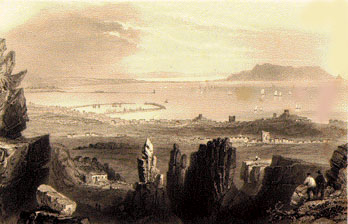 |
 |
 |
 |

Since the sixteenth century, Ireland had been a colony of the English. Under this rule, wealthy Anglican interests dominated those of the native Irish, who were largely Catholic. There were a number of seventeenth-century Catholic uprisings against the English, but none succeeded; in the 1650s, Ireland was treated as a conquered territory and distributed to favorites of Cromwell and the Protectorate. Even after the Restoration in 1660, Catholicism was not officially tolerated in Ireland. Although it was never effectively suppressed, Catholics themselves were oppressed by laws which prohibited Catholics and Dissenters from voting or owning land.
By the beginning of the eighteenth century, members of the Protestant Episcopalian Church (the Church of Ireland) -- who accounted for only about ten percent of the population -- owned more than ninety percent of the land. The period, known as the Protestant Ascendancy, saw ever decreasing rights for Irish Catholics and ever increasing control of legislative and judicial affairs from London.
Jonathan Swift, although himself a Protestant, was an important early voice against English control of Irish affairs. Campaigns against the English continued throughout the middle of the century, and increased considerably when the American and French Revolutions drew the occupying force away from Ireland. Irish patriots such as Henry Grattan and Henry Flood did much to improve the lot of Irish Catholics, and benefited from England's eagerness to keep Catholic Ireland from supporting revolutionary France. But except in Ulster, where the the English and Scots had a powerful presence, its administration remained unpopular.
A rebellion of Irish radicals, most of them with revolutionary sympathies, finally took place in 1798. England's response was the Act of Union of 1801, which merged Ireland and Great Britain into the United Kingdom. Patriots such as Daniel O'Connell were strongly opposed to the move and advocated greater home rule, but the Irish Parliament was effectively eliminated. Reaction against British rule lacked a center, but remained strong throughout the early ninteenth century. Only in 1829 were civil rights extended to Catholics, who remained discontented with the Union. This wave of protest was halted only by a series of bad potato crops in the 1840s -- the Great Potato Famine -- which killed nearly a million people, and led to large-scale emigration, mostly to America. The southern counties of Ireland gained independence from Great Britain only in the early twentieth century.